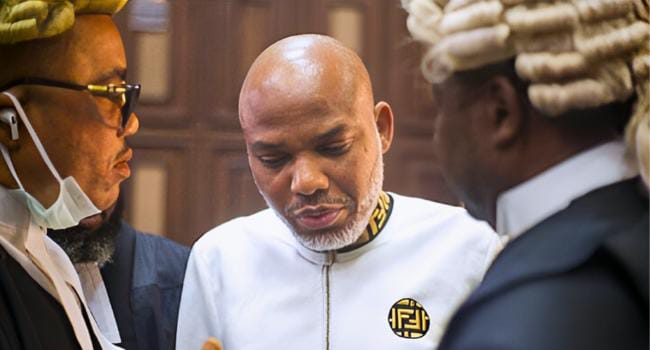The leader of the Indigenous People of Biafra (IPOB), Mazi Nnamdi Kanu, has decried what he calls a series of executive and judicial manipulations against him since his extraordinary rendition in 2021.
In an open letter addressed to Nigerians, Kanu recalled past court rulings in his favor and accused the federal government of deliberately undermining them.
“In a judgment entered on March 1, 2017, the Federal High Court, Abuja, ruled that the ‘IPOB is not an unlawful group’. At the time, it received widespread publicity which can be verified.
“This landmark ruling (made by the court before it turned unjust) emanated in a criminal proceeding that required ‘proof beyond reasonable doubt’ and in which the federal government and my humble self presented our respective cases.
“Alas! Instead of the federal government to go on appeal as the law mandated (if they are dissatisfied with the judgment), the former Attorney-General (Abubakar Malami) went behind closed doors with a letter signed by late Abba Kyari and got IPOB proscribed/tagged a terrorist group in an ex parte proceeding that was conducted without notice to me or to IPOB.
“This abominable incident was the earliest sign yet that the government and its judiciary have struck an unholy and fraudulent alliance to deny me my rights and thereby imperil the life and liberty of millions who identify with IPOB.”
Kanu also referenced an October 26, 2022, Federal High Court ruling that declared his extraordinary rendition and detention unconstitutional.
“The court further ordered the federal government to apologize to me and pay me compensation. In a responsible society and well-ordered government, this judgment is sufficient to have ended my lengthy detention and encourage the federal government to constructively engage me on the issue of the self-determination agitation that triggered this whole saga.
“Pedal back to October 13, 2022, when the Court of Appeal held that: ‘The courts must never shy away from calling the executive to order when they resort to acts of executive lawlessness.’
“The duty of the courts is to maintain a balance between ensuring that law and order is obeyed and the protection of the individual from oppressive actions by the executive.
“By the forcible abduction and extraordinary rendition of the Appellant (Mazi Nnamdi Kanu) from Kenya to this country on the 27th day of June 2021, in violation of international and state laws, the lower court or, indeed, any court in this country is divested of jurisdiction to entertain charges against the Appellant.
“Despite the clarity of this judgment and its comportment with reason, the federal government refused to release me from detention while it went behind closed doors and connived with three other justices of the court of appeal who fraudulently and swiftly sat on appeal over the judgment and practically destroyed it by issuing what they termed ‘a stay of execution.’
“One may then ask: Is it not abominable for a court to stay a judgment the government already disobeyed? In a plethora of cases, the Supreme Court has held that anybody who disobeys a related court order cannot be given any judicial relief until such order is obeyed.
“This is a sound reasoning that applied to everybody but is fraudulently overlooked when it comes to my case.
“Fast forward to 15th December 2023, when the Supreme Court sent back my case to the Federal High Court for trial.
“For avoidance of doubt, that was not the only decision the Supreme Court made. It also decided that my bail should not have been revoked and it went on to state clearly that the judge exhibited significant and unacceptable bias by revoking my bail.
“In a sane society, one would expect that when the High Court received my case from the Supreme Court and hankered down for trial, it was also duty-bound to restore my bail in line with the pronouncement of the apex court.
“But that did not happen. Why? Well, your guess is as good as mine, and that is: the Court connived with the federal government to continue my detention in violation of Section 287 of the Nigerian Constitution.
“On September 24, 2024, I decided that I have had enough of taking my chances at getting justice from a judge that, in June 2021, sent me to secret police detention without fair hearing, later refused to transfer me to prison to better prepare for my trial, and capped it all by refusing to restore my bail and instead ordering an accelerated trial in the face of the reality that I will never get a fair trial whilst detained at the DSS.
“These are the major reasons that compelled me to request recusal of the judge, and having consented to it, she proceeded to make an order removing herself from my case. That order was never challenged on appeal; thus, it remains extant to this day.
“But instead of the Chief Judge of the Federal High Court to do the lawful thing by assigning my case to another judge, he connived with the federal government to eat crow and send my case to a judge that stands recused by a valid order.
“To conclude this open letter, let me make it clear that it should in no way be construed to mean that there are no decent judges in Nigeria that can be trusted to deliver even-handed justice in my case. That is not the issue.
“Instead, the issue is that my case is deliberately being shielded from judges and justices that are deemed to be committed to doing justice, even when it means that the federal government must lose.
“Be that as it may, if it will take the rest of my life in detention to produce me before a proper and impartial court, so be it. But let me say this for the world to know: I will not succumb to any trial conducted by any judge or court whose jurisdiction does not pass constitutional muster. Not now, not ever.”
Meanwhile, human rights lawyer Barr. Christopher Chidera has raised concerns over the federal government’s intention to prosecute Kanu under the repealed Terrorism Prevention (Amendment) Act 2013.
In a statement issued in Abuja, Chidera argued that the law under which the IPOB leader is being prosecuted is no longer in force.
“Any attempt to prosecute the IPOB leader under the Terrorism Prevention (Amendment) Act 2013 is legally untenable and procedurally flawed,” he stated.
He called on President Bola Tinubu’s administration to negotiate with Kanu before March 20, 2025, warning that continuing the prosecution would expose weaknesses in Nigeria’s judicial system.
“The section of the Terrorism Prevention (Amendment) Act 2013 on which the prosecution relies is no longer an active law in Nigeria.
“The jurisdiction to prosecute Kanu under this Act ceased with its repeal. Continuing with this prosecution would draw scrutiny and criticism both domestically and internationally,” Chidera added.
With Kanu set to represent himself in court on March 21, 2025, Chidera suggested that this could further highlight inconsistencies in the judiciary.
“Reports that Mazi Kanu will assume his own defense on March 21, 2025, signal a significant shift in this case. His self-representation may reveal inconsistencies and vulnerabilities within Nigeria’s judicial system,” he said.
Describing the case as a major test for the judiciary, Chidera urged the Tinubu administration to rethink its approach.
“Political dissent cannot be extinguished by force, and the Biafran struggle will not be subdued by crackdowns or detention without trial,” he emphasized.

















